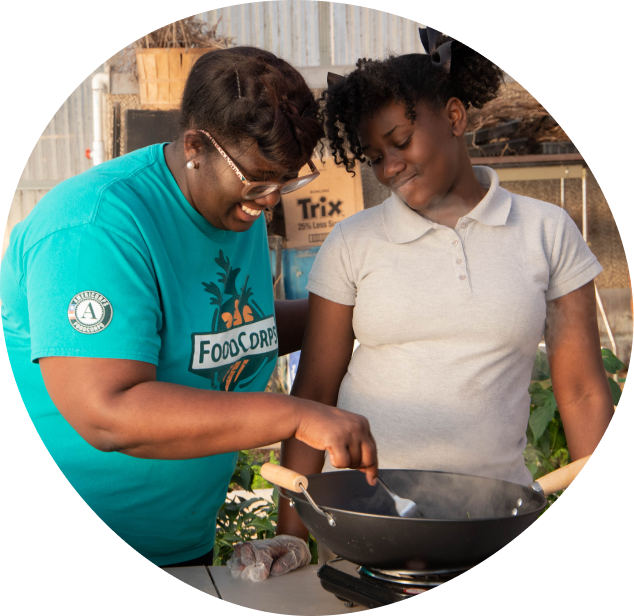
FoodCorps Welcomes Inaugural Cohort of Kindred Fellows
Join our corps! Applications for 2026-2027 are now open. Apply by March 30.
A year of deep community engagement.
Reflecting on the 2022–2023 school year, we’re grateful for your trust and support as we mapped the pathway toward healthy school meals for every child in the country. Building on the value our school program has brought communities since 2010, we evaluated the additional ways we—in partnership with other changemakers—could actualize our 2030 goal: that all 50 million public school students have access to food education and free, nourishing school meals.
We’ve made key shifts toward achieving our ambitious goal, including improving our training and professional development opportunities, and piloting a family engagement program in four states to broaden our impact into communities and homes. We also prioritized our network of food leaders and alumni as change agents and deepened our involvement in state and national policy work to carry this movement forward.
As you’ll read throughout this report, the power of food in schools is gaining national momentum that transcends political differences. In communities as varied as Providence, St. Louis, and Appalachian Kentucky (all newly served by FoodCorps this year), we are honored to work alongside partners and communities to elevate food as not only a fundamental need for kids to learn and grow, but a source of connection, agency, and joy.
On behalf of everyone at FoodCorps, we thank each of you for your contribution to this movement. We are especially grateful for FoodCorps’ partners and supporters who entrusted us with their resources to move toward healthier futures for all students. As we continue to pursue access to food education and nourishing school meals for every student, we promise to do so with full transparency, accountability, and a commitment to always center students.
We hope you feel inspired to stay on this exciting journey with us.
In deep gratitude,

 Curt Ellis, Co-Founder and Co-CEO, and Dr. Robert S. Harvey, President and Co-CEO.
Curt Ellis, Co-Founder and Co-CEO, and Dr. Robert S. Harvey, President and Co-CEO. Curt Ellis, Co-Founder and Co-CEO, and Dr. Robert S. Harvey, President and Co-CEO.
Curt Ellis, Co-Founder and Co-CEO, and Dr. Robert S. Harvey, President and Co-CEO.
Fifth graders in California rate the Harvest of the Month after a mindful tasting lesson by FoodCorps AmeriCorps Member Brandi Aldana.

This year, our two-track service program connected more than 350,000 students to the joy and power of food in 257 schools and districts. Food Education AmeriCorps Members focused on teaching students about nourishing food from its history to the seed-to-table process. And School Nutrition AmeriCorps Members focused on supporting district nutrition goals, sourcing local food, surveying students on meal preferences, and promoting newly added cafeteria foods. Together, they collaborated to support seasonal events like harvest and food festivals, as well as launching our first year of family engagement programming in four states to increase our reach from schools into homes.
We’re most proud of this cohort for their steadfast dedication to their students, for how they supported and learned from each other over the academic year, and for the energy and time they put into building intentional relationships with people in the community.
“We’ve given students a voice and created a self-sustaining, integrated food education program, where all subject areas converge and make sense for students. Our partnership with FoodCorps has been invaluable. We couldn’t have done this without them. And now, we’re leading the state by example.” — Glen Widmer, EdD, Principal of Ames and Weymouth Schools, Maine
hands-on lessons
gardens supported
foods added to cafeteria menu
nourishing food tastings
farm-to-school outreach efforts
family engagement activities
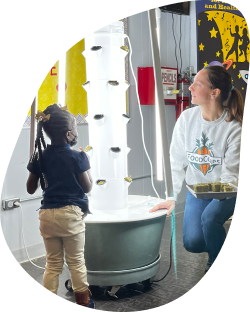
The 2022–2023 school year marked the conclusion of Krista Davis’ service to children and families as a FoodCorps AmeriCorps member at Mississippi’s Bell Academy; however, her service to the district would grow. During her four years at Bell Academy, Krista supported the development of the school’s garden, taught more than 1,000 hands-on lessons about food, secured grants, and built strong relationships with children and families—all bringing to light the power of food and garden education. When presented with testimonials from students and families about the impact food and garden education had on their lives, the Cleveland School District’s board of education voted to fund a full-time Health and Wellness Director position so that more students could experience the same kind of joy and incredible learnings. Krista got the job. As Health and Wellness Director, Krista will expand food and garden programming to all elementary schools throughout the district. “When kids touch, feel, plant, grow, harvest food, then eat it, there’s so many things that’ll last a lifetime. And they can teach others and their families,” says Krista.
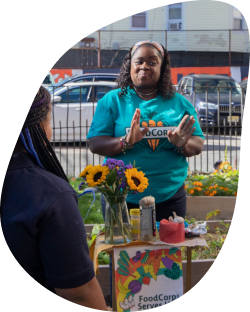
FoodCorps AmeriCorps Member Bridgette Byrd incorporated mindful, sensory awareness into her lessons to create memorable experiences for her students. “I want students to be aware of what they visually notice, how food smells, using descriptive words, and what their taste buds recognize during a tasting,” shares Bridgette. Last May, she introduced asparagus to a fourth grade science class after a lesson on vegetable properties, nutrients, and growth patterns. She set up the demonstration and taste test like a cooking show and shared tips on how to get an al dente texture. The students asked questions and commented throughout the demo. After licking the plates clean, every student gave ‘Amazing Asparagus’ the highest ranking possible and shared descriptive words about why they loved it from texture to smell. “One student said, ‘I feel like we’re in the audience of a cooking show with Mrs. Byrd.’ For me, that was the highlight of the day,” adds Bridgette. Watch Bridgette share how she’s cultivating community through food in Newark, New Jersey.

At Alanson Public School in rural Petoskey, Michigan, school officials asked FoodCorps AmeriCorps members to develop a series of lessons in response to observing students demonstrating unhealthy eating habits. Through an anonymous poll developed by FoodCorps AmeriCorps members, eighth graders were asked, “Where do you receive messages and ideas about food and bodies? How do you decipher between which food and body messages are true and false? How does this messaging, negative or positive, affect your relationships with food and your body?” In response to survey revelations—including the fact that many students received messages about body image from social media—School Nutrition Member Lauren Driscoll carefully developed a six-week lesson series, supported by Food Education Members Meghan Monaghan and Courtney Wilber. Each lesson included themes related to body image and healthful nourishment, and the preparation of a meal or snack in a fun and engaging way. School officials noticed a remarkable change in students, including the demonstration of healthier eating habits. The series was such a success that neighboring districts asked that it be available to their students.
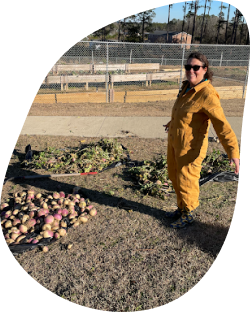
Jme (pronounced “jay-mee”) Dunlow met families where they were: in car rider lanes at school. As a FoodCorps AmeriCorps member, Jme provided hands-on food education lessons to students, while developing and implementing strategies to engage families as a part of FoodCorps’ Family Engagement Pilot. When a fellow member shared that a local high school’s garden had produced an overabundance of turnips, Jme rolled up her sleeves to ensure that the fresh, locally grown produce did not go to waste. Jme enlisted the support of students for harvesting, then created “turnip kits.” The kits—distributed to parents and caregivers during afternoon pick-up in the car rider lanes at local schools—included turnips and easy-to-make recipes that families could prepare together using simple ingredients found in most kitchens. “We felt it would be easier to talk to parents in the car rider lanes, and we knew the kits wouldn’t accidentally get left on school buses,” shared Dunlow. The kits were a hit! Jme is now affectionately referred to as “The Turnip Lady” in the Baldwin County School District where she continues to serve.
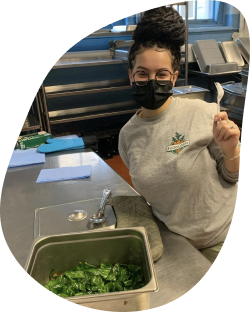
Shalynn “Shay” Brooks, a FoodCorps AmeriCorps member in New Bedford, Massachusetts, made national headlines by bringing Black history into classrooms and cafeterias. Working with the school district and Marion Institute, she developed several dishes based on her family’s traditional soul food recipes for her students to try. Shay paired the dishes with Black history lessons, teaching her students about lesser-known historical Black figures like James Hemings, the Black chef enslaved by Thomas Jefferson who created macaroni pie, the precursor to one of America’s most iconic and loved foods: mac and cheese. “The connection between food and Black history just wasn’t taught when I was growing up in schools,” Shay told a reporter. This past year, she introduced her students to collard greens. “The taste test went really well. The students tried and loved the greens,” adds Shay. Beyond Black History Month, some of the dishes will be added to the district’s rotating cafeteria menu year-round.
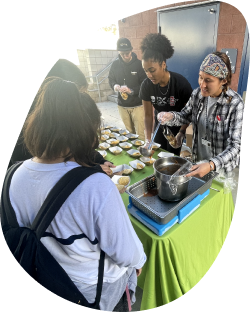
When she began her service in San Diego, California, Cierra Peterlin hoped to spread the joy of plants—plant-based lunch, that is! She was in luck: the district’s culinary specialist, Chef Juan Zamorano, was testing plant-based recipes to add to the menu. Cierra worked with Chef Juan to modify a beef taco recipe with a lentil-based crumble option. They gave the new dish a fun name—the Baja Bean Taco—and Cierra visited middle and high schools to offer students samples and get their feedback. “It was a major leap forward to be able to garner so much buy-in from the district-level food services staff as well as the staff at individual schools,” Cierra says. Though the meatless tacos aren’t a permanent menu item just yet, Cierra says the project illustrated the value of introducing kids to new foods. At one middle school tasting, a student lit up when he saw the tacos; his older brother at the neighboring high school had already tried them. “I love that moment,” Cierra says, “because it showed students and siblings connecting over what was being served at school lunch.”
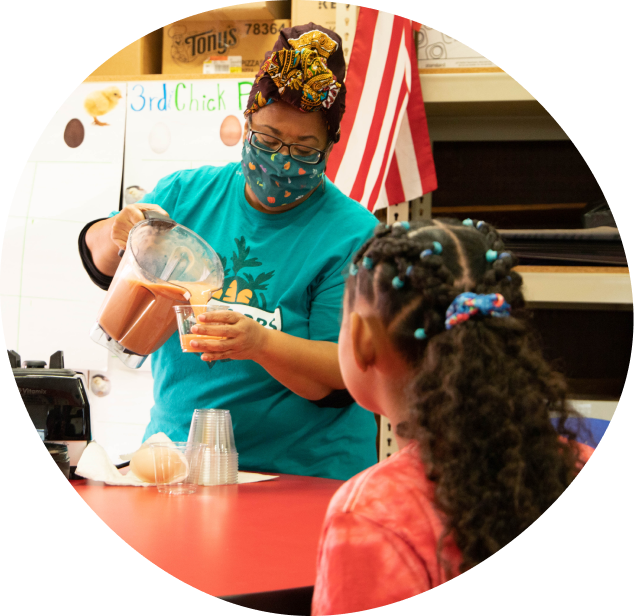
We train, support, and build networks for emerging leaders—in multiple areas of our work—so that they become agents of change within the food and education systems. This past year, we identified three cohorts of leaders in our community who hold the power to help actualize our 2030 goal: FoodCorps AmeriCorps members, alumni, and Food Operators and Leaders of Color in Schools (FOLCS).
To build this leadership pipeline with more intention, we doubled down on our recruitment strategy—starting earlier and recruiting throughout the year. As a result, we hired more BIPOC candidates local to their communities who best reflect the identities and lived experiences of the students they serve. And thanks to the financial support from our partners, we succeeded in paying members the maximum stipend allowed, a critical step.
increase in BIPOC FoodCorps AmeriCorps members
of FoodCorps AmeriCorps members local to their communities
of alumni enter mission-aligned careers
BIPOC school food leaders joined FOLCS

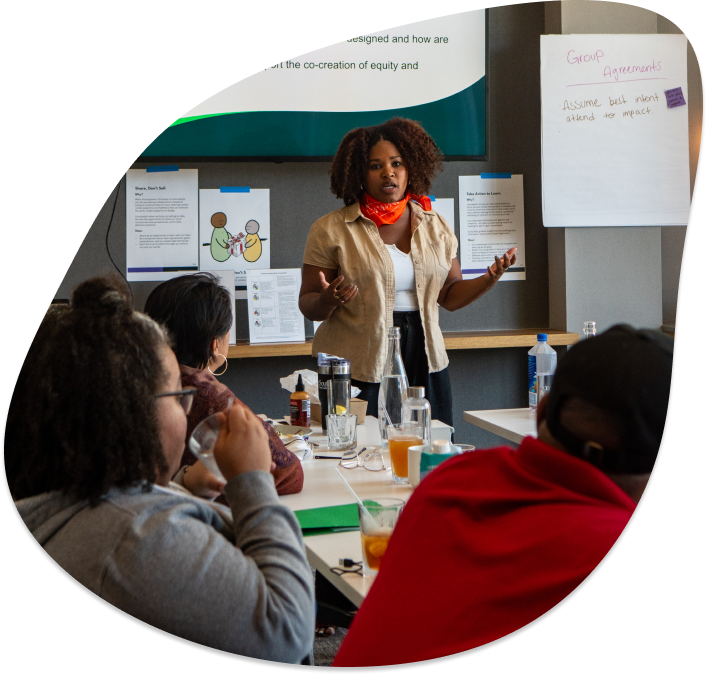 Morgan McGhee, FoodCorps’ Director of School Nutrition Leadership, leads a lesson on liberatory design with members of FOLCS, Food Operators and Leaders of Color in Schools. Photo by Franklin Ikenna Ikekwere.
Morgan McGhee, FoodCorps’ Director of School Nutrition Leadership, leads a lesson on liberatory design with members of FOLCS, Food Operators and Leaders of Color in Schools. Photo by Franklin Ikenna Ikekwere.FoodCorps AmeriCorps members felt more confident and equipped for their roles after shifts we made to our training program, including adding new lessons to orientation: Centering Communities, Cultural Inclusion, and Navigating Challenges. We also offered differentiated training tracks for food education and school nutrition and in-service, on-the-ground learning days. And halfway through the service year, members had the opportunity to attend regional, in-person gatherings to strengthen their skills, re-energize in community, and focus on career development. In total, each member received at least 76 total hours of specialized training throughout the school year.
“My biggest takeaway from the mid-year gathering was the session on networking. I knew it was vital to career growth, but always feared the idea. I have allowed fear to cause me to miss out on many opportunities. Not anymore! The tips, tricks, and practice I learned helped ease my fears.” —Gwendolyn Rice, FoodCorps AmeriCorps member in Mississippi
FoodCorps alumni—equipped with training, a year or more of service, and a supportive network—grow into justice leaders who support change efforts within their institutions and communities. This year, we launched FoodCorps’ Alumni Policy Chapter Leads Pilot to support campaign and advocacy priorities at the state and national level and raise community voices toward policy change in support of our 2030 goal. The initial cohort of eight passionate and motivated alumni represents a variety of industries and hails from across the country: California, Georgia, Hawai’i, Iowa, New York, North Carolina, and Washington, D.C.
“I was able to learn to advocate for things I care about that happen outside the classroom.” — Miki Nakano, D.C. Alumni-Policy Chapter Lead
FoodCorps partnered with Arizona State University, who received USDA NextGen Grant funding to offer 10 full-tuition scholarships to FoodCorps alumni and returning FoodCorps members—prioritizing BIPOC and first-generation college students—for a graduate certificate in Food Policy and Sustainability Leadership and MS in Sustainable Food Systems at Arizona State University.
Re-launched in October 2022, the Food Operators and Leaders of Color in Schools (FOLCS) network of experienced and brilliant allied partners, AmeriCorps members, alumni, food service directors, and school staff grew to 152 members. In June 2023, its members had the opportunity to meet in person at the FOLCS Kindred Gathering—a space where like-minded individuals could share their experiences, collaborate, learn, and lay the foundation for a just and sustainable future in school food—something that was unprecedented for BIPOC school nutrition professionals. During the convening, attendees learned about principles of liberatory design and how to implement them in their roles. The gathering also served as a space to co-create the framework of the FOLCS Fellowship Program.
“FOLCS brought me out of my shell. It’s helping me understand that I’m not alone, and that we’re in this together. I know FOLCS is going to change the world.” — Arlethia Brown, Director of School Nutrition at Camden City School District and FOLCS member

Kendal Chavez was a key player in Governor Michelle Lujan Grisham’s push to make school meals free in New Mexico in March 2023 and has dedicated her career to improving New Mexico’s local food system. As the former Farm to School Specialist at the New Mexico Public Education Department, Kendal worked in partnership with 58 rural, urban, and tribal schools and school district entities across the state. “Food is in my being. I come from a farming community. It’s been a gift to see the work from almost every angle. My job is to find this place of balance among these many perspectives while protecting this reality that native and Indigenous people have been growing food here forever; those are the folk that should be leading the way and have been modeling how to protect water and soil,” says Kendal in an interview on KUNM radio station.

Njeri Jenkins, Parent Advocacy Coordinator at Educare DC and a FoodCorps alum and former Policy Project Coordinator, reflects on her early career aspirations. “I chose FoodCorps because I always wanted to be able to make a difference in communities like the ones that raised me. I also wanted to gain experience in food insecurity, and give students a way to share their experiences with others,” she says. Njeri graduated in May 2023 with a Masters of Public Policy from the University of Maryland. Leading up to her graduation, she was presented with an opportunity of a lifetime to attend a White House event and much to her surprise, she found herself meeting President Joe Biden and Vice President Kamala Harris. Since graduating, she aspires to work in international development and security focusing on food insecurity, sustainability, the security of women and girls, and domestic terrorism.
Across the country, the movement for food equity ignited a groundswell of support for free school meals, food education in schools, and increased access to fresh, locally sourced food this past year. FoodCorps’ collaboration with the Biden-Harris Administration reached a peak in September 2022, when we were invited to the White House Conference on Hunger, Nutrition, and Health after mobilization efforts to amplify local leaders’ experiences and wisdom. We had the honor of sharing our experiences through panelists FoodCorps alum Phoebe Wong and FoodCorps partner Donna Martin. Then in a pivotal moment, Secretary of Agriculture Tom Vilsack announced FoodCorps’ $250 million Nourishing Futures initiative.
Thank you to our partners who have collectively committed $66.2 million to Nourishing Futures!
Following the conference, FoodCorps was encouraged to see that the National Strategy and White House Challenge to End Hunger included core policy recommendations that FoodCorps has been prioritizing and advancing as part of our commitment to nourish all students across the country. In support of improving school nutrition, the USDA invested $100 million in technical assistance and incentives for healthy school meals.
At the state level, FoodCorps is proud to be a part of a greater advocacy community supporting kids’ access to nourishing school meals without stigma or paperwork burdens; to date, eight states have passed permanent policies with 30 other states passing partial policies or running active campaigns in support of free school meals for all. As a result, nearly 11 million kids in the U.S. currently have access to the nourishment they need through state legislation.
On March 27, 2023, New Mexico became the fourth state to pass permanent legislation ensuring access to free, nourishing school meals for every child. The policy passed unanimously after a decade of local stakeholders building intentional relationships; listening to school, district, and community needs; and garnering both credibility and support. FoodCorps supported this historic win by organizing a sign-on campaign—gathering support from more than 50 partner organizations. A key player in lifting community voices to the state legislature, FoodCorps’ New Mexico Impact and Partnerships Lead Alicia Chavez mobilized more than 200 advocates, including families and their first graders. Also instrumental to this historic moment was Kendal Chavez, Food and Hunger Advisor for Governor Michelle Lujan Grisham, who testified before the state and is working on implementation strategy. Watch this interview for an inside look at the strategy behind this transformative policy.
Connecticut Governor Ned Lamont signed a suite of supportive school food policies into law in June 2023, which quadrupled previous funding amounts. With leadership from FoodCorps and New Britain ROOTS and working in partnership with the CT Farm to School Collaborative and the School Meals for All CT Coalition, the state committed to a more than 100% increase in funding for the CT Grown for CT Kids Grants Program in the 2023–2025 school years, the creation of a CT Local Food for Schools Incentive Program, and a $16 million investment to support free school meals. On top of that, Connecticut opened its first-ever farm to school institute with support from five partners, including FoodCorps. Watch the video here.
Ryan Parker, FoodCorps’ Maine Impact and Partnerships Lead, wrote and submitted legislation in Maine to create a grant program funding 13 food educator positions in schools and districts over three years. The legislation was unanimously supported by the Agriculture Committee, and the full legislature sent it to the special appropriations table where it was carried over to the upcoming session. In the meantime, our partner schools and districts in Maine created three food educator positions, two of which were filled by FoodCorps alumni.
Ryan was also one of three leaders who envisioned, created, and implemented Maine’s first Farm & Sea to School Institute, which supports schools to increase healthy food access, create a culture of equity and wellness, and strengthen their local food systems. The institute brings school teams together to build relationships, skills, and a collaborative, sustainable action plan for farm and sea to school programming.
Michigan passed a state budget that includes a free breakfast and lunch for every Michigan public school student in the 2023–2024 school year. In the year leading up to this win, Seema Jolly, FoodCorps’ Michigan Impact and Partnerships Lead, met with key partners leading this campaign and helped activate school districts and community members to share their support for Healthy School Meals for All. The American Heart Association, in partnership with No Kid Hungry Michigan and the School Nutrition Association of Michigan, formed the Michigan School Meals Coalition, and the work will continue in the upcoming school year to ensure that Healthy School Meals for All becomes permanent in Michigan. As the coalition work continues, FoodCorps staff based in Michigan look forward to activating partners, schools, community members, and families to share their voices about the importance of school meals to lawmakers.
In pursuit of our 2030 goal, we began building out the blueprint to grow one million supporters in favor of the policies that would bring our vision to fruition through mass awareness and education. Throughout the year, we seized opportunities to tell stories of the joy and power of food in schools through the lenses of the communities most impacted by our current food and education systems. While our presence at the White House Conference garnered the most media attention, we saw stories like Shay Brooks’ soul food lesson featured above sweep the nation and bring awareness to the importance of culturally responsive food in schools.
social media impressions
total website visitors
FoodCorps mentions in media
increase in total # of advocates
The past year was an important one for FoodCorps’ community-based work. Our entire staff gathered in person, an opportunity to renew our connections and our commitment to make a difference at the community level. The 2022–2023 school year also brought about new leadership and new organizational values, all grounded in the value of local, place-based work. Read on to learn how our members celebrate local food traditions.
Meet our membersFoodCorps is beyond grateful to all our supporters and partners who prioritized students and their futures in the 2022–2023 school year. We thank you for believing in the joy and power of food in schools to nourish students—especially those most impacted by systems of oppression. Below are the key corporate, foundation, and government partners who helped make the accomplishments and highlights listed in this report possible. We are also honored by the generous support of the many families and individuals (although not listed here) who helped advance this movement toward greater food justice for youth in schools. We look forward to soaring toward our 2030 goal together while staying rooted in the power of collaboration and trust.
Lunchtime at Pierce Elementary School in Flint, Michigan.
Former First Lady Michelle Obama announced a $1 million commitment from PLEZi Nutrition to FoodCorps’ Nourishing Futures initiative at The Wall Street Journal Future of Everything Festival. The partnership leverages FoodCorps’ and PLEZi Nutrition’s shared values of putting kids first, building connections to nourishing food, ensuring accessibility, and driving positive change and impact for children everywhere. “FoodCorps’ proven commitment to uplifting children through nourishing food in schools speaks to the heart of PLEZi’s mission to help raise a healthier generation of kids,” says Sam Kass, PLEZi Nutrition Board Co-Chair.
$1 million+




$250,000 – $499,999

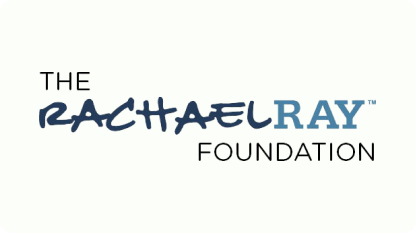

$100,000 – $249,999



$25,000–$99,999






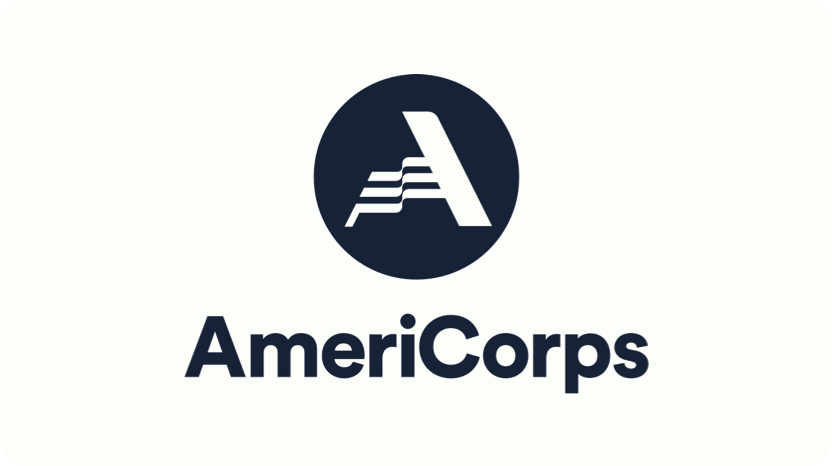

= FoodCorps Alumni

Board Co-Chair, Former CEO of America’s Promise Alliance, Former Director of AmeriCorps

Board Co-Chair, CEO & Founder, Elevating Equity

Board Secretary, Managing Partner, New Profit Inc.

Executive Director, One Generation

Chief Program Officer, Reconstruction

Food and Hunger Coordinator, Office of Governor Michelle Lujan Grisham

Founder and CEO, Springboard Collaborative

Director of Food and Environment, Union of Concerned Scientists

Director of the Public Policy Program and the Roosevelt House Institute for Public Policy at Hunter College

CFO & Co-Founder, Box

Lawyer and Philanthropist

Philanthropist

Co-Founder & Co-CEO, FoodCorps

President & Co-CEO, FoodCorps
= FoodCorps Alumni

VP of Finance
Pronouns: Pronouns: he/him
VP of People & Equity
Pronouns: Pronouns: she/her
VP of People & Equity
Pronouns: Pronouns: she/her
Co-Founder & Co-CEO
Pronouns: Pronouns: he/him
President & Co-CEO
Pronouns: Pronouns: he/him
VP of Impact Programs
Pronouns: Pronouns: she/her
VP of Impact Operations
Pronouns: Pronouns: she/her
Chief External Relations Officer
Pronouns: Pronouns: she/her| Assets | FY23 |
| Current Assets | |
| Checking and Savings | 14,003,271 |
| Accounts Receivable | 11,438,926 |
| Other Current Assets | 44,124 |
| Fixed Assets | 227,241 |
| Other Assets | 10,000,000 |
| Total Assets | 35,713,562 |
| Liabilities and Net Assets | |
| Liabilities | |
| Accounts Payable | 220,706 |
| Credit Card Charges | – |
| Other Liabilities | 4,151,645 |
| Total Liabilities | 4,372,351 |
| Net Assets | |
| Temporarily Restricted Net Assets | 18,367,118 |
| Income and Unrestricted Net Assets | 12,974,093 |
| Total Net Assets | 31,341,211 |
| Total Liabilities and Equity | 35,713,562 |
| Revenues | |
| Corporate | 5,217,582 |
| Foundation | 3,000,353 |
| Government | 5,679,481 |
| Individual | 5,998,629 |
| Program Service Fees | 1,494,515 |
| Other (in kind, special events) | 21,418 |
| Investment Income | (2,783) |
| Total Revenues | 21,409,195 |
| Expenses | |
| Service Member Stipends and Benefits | 12,341,051 |
| Staff and Fellow Salaries and Benefits | 5,771,713 |
| Contract Services | 843,419 |
| Marketing and Communications | 205,307 |
| Grants to Other Organizations | – |
| Nonpersonnel Expenses | 861,984 |
| Facilities and Equipment | 484,264 |
| Travel and Meetings | 1,271,849 |
| Other Expenses | 165,872 |
| Total Expenses | 21,945,459 |
| Net Income | (536,262) |
| Program | 74.90% |
| Operations (Administration) | 8.96% |
| Development (Fundraising) | 16.14% |
| 100% |
Donate to nourish the lives of school kids
Subscribe to our newsletters and channels
Share our work with your community
Advocate for nourishing futures for every student
